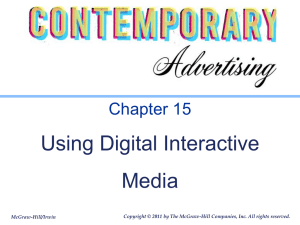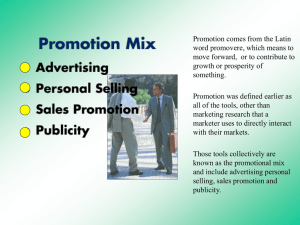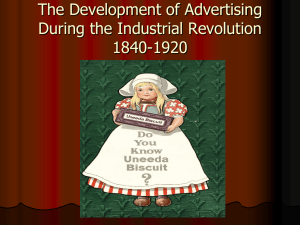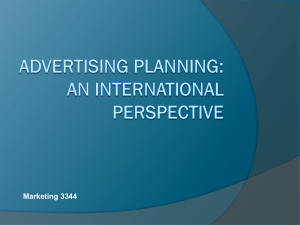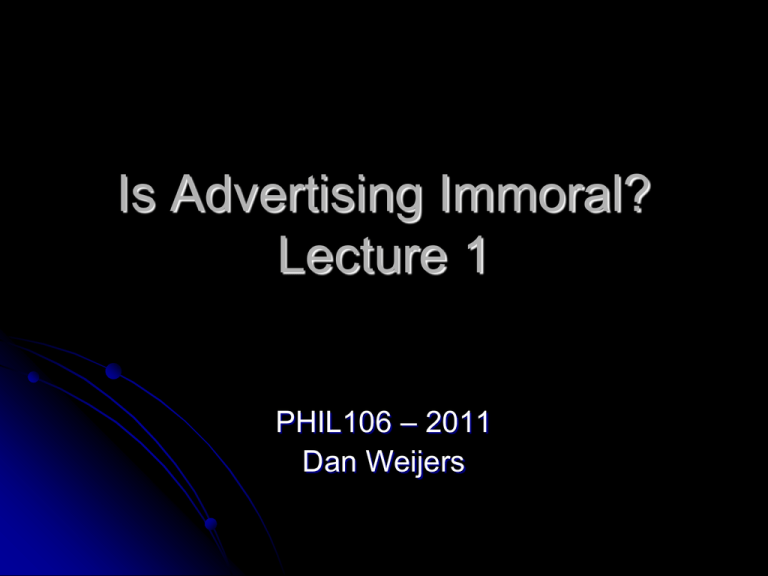
Is Advertising Immoral?
Lecture 1
PHIL106 – 2011
Dan Weijers
Is Advertising Immoral?
Topic Summary
Does advertising manipulate us?
Lecture 1: Reekie’s defense of advertising
Lecture 2: Crisp’s limited critique of advertising
Does advertising make us unhappy?
Lecture 3: Belch & Belch vs. Hamilton
Lecture 4: Hamilton again
Persuasive Vs. Informative Advertising?
Lecture 5: Santilli vs. Emamalizadeh vs. Lee
Assessment for this Topic
There will be one essay question and one
exam question on my lectures (the morality
of advertising)
Essay question: ~is advertising immoral?
Based on lectures 1-4
Lectures 3-4 especially important
Exam question: ~informative/persuasive ads
Based on lecture 5
Information from lectures 1-2 also useful
Does Advertising Manipulate
Us?
Reekie’s Defense of Advertising
PHIL106 – 2011
Dan Weijers Chad Chaddingworth Jnr III
Today
Start addressing the question:
Is advertising immoral?
An explanation of advertising
A defense of advertising
Setting up some of the moral issues
Advertising is…
Communication from a specific source that
intends to inform and influence the
audience so that they believe something
and/or behave in a certain way
It is usually:
Persuading people to purchase a brand/product
Paid for
Using mass media
But
some marketers are much sneakier…
Advertising might also be…
Rosser Reeves
Manager of a
successful advertising
company
While holding up two
coins:
“[Making] you think
that this quarter is
more valuable than
that one”
Previous ‘Fans’ were Tested
Volunteers
were either
Speights or Tui fans
Blind taste test of four cups
Results:
Everyone
got most wrong
Everyone preferred Speights
slightly, but
No one could even tell which
ones were the same
Thanks to Duncan Reekie
Most of these arguments are his
See his reading in the course book
But, the cutting-edge research tailored to
the NZ commercial, cultural and moral
environment has been carried out by me
The Role of Advertising
Advertising supports marketing and business
function.
A modern business model:
Perform consumer research
Develop new product based on research
Advertise product
Sell product
Importantly, both the business and the
consumers benefit from this
The business makes money for its investors
The customers get what they have been wanting
The Benefits of Advertising
Advertising helps consumers
decide what to buy
Informs about the existence of
new products (e.g.)
Informs about new uses for
existing products (e.g.)
Informs about differences
between products – laundry
powder & razors (e.g.)
Advertising provides
incentives to:
Make differentiated products, &
Innovative products
Who doesn’t like PS3s, wi-fi,
iphones?
The Benefits of Advertising 2
Advertising is
entertainment
Many ads are:
Funny
Interesting
Artistic
Appealing in
other ways
The Benefits of Advertising 3
Advertising is good for the economy
It is a huge industry
It employs a lot of people
It stimulates economic growth by connecting
more of consumers needs and wants with
solutions
Economic growth is good
Means you can get more things you want
The Benefits of Advertising 4
Winston Churchill:
“Advertising nourishes
the consuming power of
men. It creates wants
for a better standard of
living… It spurs
individual exertion and
greater production.”
Advertising improves
our well-being
So, What’s Wrong with Advertising?
Apparently, advertising deceives people
into buying things that they don’t really
need
Apparently, advertising lies, deceives and
misleads
Apparently, advertising makes people think
they need things that they shouldn’t even
want
Some people even think it makes us unhappy!
Advertising Doesn’t Lie
Reasons why advertisers don’t lie
Misleading ads are reported and removed from
circulation
280
ads removed in 2007 by ASA
ASA: “Truthful Presentation - Advertisements should
not contain any statement … which … is likely to
deceive or mislead the consumer … or exploits
his/her lack of experience or knowledge.”
ASA: “(Obvious hyperbole, identifiable as such, is not
considered to be misleading).”
Advertising Doesn’t Lie
Reasons why advertisers don’t lie
Misleading ads are reported and removed
from circulation
Lies about product quality are soon
discovered, making the lying company go out
of business
Really important product categories have extra
regulations to prevent lying
Advertisers don’t want to tarnish the reputation
of advertising generally
Advertising Doesn’t Make Us Buy
Things We Don’t Need
Advertising never forces anyone to do
anything
Advertising does influence our purchase
decisions (at least it intends to)
But what is wrong with that?
Advertising can’t encourage you to want
something you really don’t need
Advertising can only help you fulfill wants and
needs you already have
Should Advertising be Allowed to
Help Us Fulfill Our Wants?
Should we stop people from helping others
to fulfill their wants?
Depends on the wants…
Some things we want are bad for others
Slaves, over-sized cars, blow-off valves
Some things we want are bad for ourselves
Cigarettes, highly processed foods, blow-off
valves
Should Advertising Help Us Fulfill
Our Wants?
Advertising obviously shouldn’t encourage or help
people to harm others but…
What is better, freedom or having the government
protect us from our own wants?
Why shouldn’t I be able to do whatever I want with
my money (without hurting others)?
Who should decide what we should and shouldn’t want
(for our own good)?
Consumer Sovereignty: Surely I have that right!
Where do we draw the line?
Summary
Advertising is good because:
It helps consumers decide what to buy
It provides incentives for innovation
At least some of it is entertaining
Its good for the economy
It allows us to improve our lives (as we see fit) by
helping us to satisfy our wants and needs
Busting the myths about advertising:
Advertising does not lie or deceive
Advertising cannot make people buy things they don’t
want
Next Time
Dan is back
Read:
Roger Crisp’s ‘Persuasive Advertising,
Autonomy, and the Creation of Desire
Get ready to discuss:
Why advertising actually is immoral – it creates
desires in us that we cannot even attempt to
reject
Does Advertising Manipulate
Us?
Crisp’s Limited Critique of
Advertising
PHIL106 – 2011
Dan Weijers
Last Time (with Chad)
Advertising is good because:
It helps consumers decide what to buy
It provides incentives for innovation
At least some of it is entertaining
Its good for the economy
It allows us to improve our lives (as we see fit) by
helping us to satisfy our wants and needs
Busting the myths about advertising:
Advertising does not lie or deceive
Advertising cannot make people buy things they don’t
want
Today
Looking at an argument that
a certain type of advertising
is immoral
Roger Crisp:
“In this paper, I shall argue
that all forms of a certain
common type of advertising
[persuasive advertising] are
morally wrong, on the
ground that they override
the autonomy of
consumers.”
Informative Adverts
Crisp: informative
advertising is usually
OK because it
facilitates (not
overrides) the desiremaking process
E.g. Jacket on sale
He already wanted that
kind of jacket, now he
knows where to get it
(for cheap)
Persuasive Adverts
Crisp: ‘persuasive advertising’ is
immoral because it overrides our
autonomy (our ability to make
purchase decisions for ourselves)
Forms of persuasive advertising (by which the
desire for products can be created):
Repetition – drumming a brand into your head
‘Puffery’ – linking the product to unconscious survival
and reproduction-related desires
Subliminal ads – New Jersey cinema experiment
How Subliminal Ads ‘Work’
Unconscious emotional manipulation by
Suggestion – often just the product logo
Association – the logo and something good
If you are aware of seeing/hearing it, then
it’s not subliminal advertising
(or it’s a failed attempt at subliminal
advertising)
Subliminal Ad. Attempts?
This is an
attempted joke
at the very
least!
WARNING!
Look away now
if you don’t
want to see a
sexually explicit
cartoon
The Truth about Subliminal Ads
Subliminal ads alone can’t
make you buy something
that you didn’t want
Purchasing a product is
too complex a behaviour
for subliminal ads to
control
Unconscious priming
works sometimes
Some priming is rejected
Arrington: Autonomous Desire
Desires are autonomous if we
accept them
E.g. Arrington sees an ad for
hair dye
He desires hair dye because he
desires to look younger
And, he is perfectly happy to
have both of those desires
Therefore, (according to him) his
desire for hair dye is autonomous
Crisp: Autonomous Desire
Is Arrington’s desire autonomous?
What if the ad showed a man (with 100%
not-grey hair) in a position of authority and
surrounded by beautiful women?
Perhaps Arrington's real desires were for
power and sex
Show your
experience
and vitality
Crisp: How Adverts Persuade
They appeal to our unconscious desires
Crisp: they might appeal to our
“unconscious desires for power and sex”
Unconscious Desires?
The unconscious desire for sex
Makes us laugh at jokes that aren’t funny
The unconscious desire for power
$$ is the best indicator of power these days
Makes us angry/disappointed if we don’t get
that promotion/job we were after
Also makes us laugh at jokes that aren’t
funny
Evolution by Natural Selection
Over many generations, types
of organisms tend to develop
traits that increase individual
members chances of surviving
and reproducing
Unconscious desires for power
and sex are traits that can help
with this
Therefore, we should expect to
see a lot of traits that are
conducive to noticing and
getting power and sex
Unconscious Desires
Advertisers don’t always target sex and
power though
Most ads for FMCGs are targeted at
women or women and children
Remember that Persil makes your clothes
whiter?
Well, that’s not all it does:
http://www.youtube.com/watch?v=xuTspd9lFFE&f
eature=related
Crisp: Rational Desire
Persuasive advertising creates irrational
desires
If our main desire for a product is
subconscious, then rationality doesn’t
even come into it - we cannot possibly
accept it or even consider it!
Remember that an autonomous desire is one
that we accept
Crisp: Free Choice/Autonomy
Being able to provide any old reason for
why you bought something (like
Arrington’s e.g.) isn’t necessarily helpful
“But, I like Meow Mix”, “But, I like Grecian
Formula 16”
We need to weigh up the relevant
reasons in order to make a free choice
Persuasive advertising uses reasons that we
are not aware of and so cannot evaluate
Crisp: Control or Manipulation
You control someone if you
make them do something for
reasons that they would not
consider… reasonable.
Making Crisp do a jig (by tying
ropes to his limbs) just
because I feel like it would be
controlling him
Making me buy hair dye
because I unconsciously
desire power and sex
Adverts can do this
Crisp’s General Argument
1)
2)
3)
4)
Persuasive advertising unconsciously creates the
desire for a product by drumming it into your
brain or by associating it with sex, power or some
other thing that is commonly and unconsciously
craved
Therefore, the real reason for our desire to buy a
product is hidden from us, we cannot evaluate it
Therefore, the desire is not autonomous
Therefore, persuasive advertising overrides our
autonomy/freedom of choice (which is immoral)
Summary
Crisp: Persuasive advertising uses
subconscious associations to try to make us
desire products in a way that bypasses our
autonomy
Remember that this is a specific definition of
‘persuasive advertising’
Some adverts clearly try to be persuasive in
the manner Crisp suggests
Are such adverts immoral for trying to do
this?
Next Time
Read:
Belch & Belch ‘Economic Effects of Advertising’
Get ready to discuss:
Does advertising make us happy… or
unhappy?
Does Advertising Makes Us
Unhappy?
Belch vs. Hamilton
PHIL106 – 2011
Dan Weijers
Recap of Crisp
Persuasive advertising uses repetition and
subconscious associations to try to make us
desire products
Crisp thinks it works and that it is immoral
because it overrides our autonomy
It most likely works to some extent, because
persuasive advertising is so widespread
Does it actually override our autonomy, though?
Is it manipulative enough to be immoral, though?
Today
The advertisers
argument for
how advertising
makes us
happier
Hamilton’s
criticism of that
argument
Problem: Margin of Discontent
Margin of Discontent = Gap
between what we have and what
we want
Happiness = satisfaction with how
your life is going (no discontent)
Examples of discontent :
You have a Corolla, but you want a
Porsche
You work at McDonalds, but you
want a job at Logan Brown
You have a 14” tube TV, but you
want a 41” flat screen
Hamilton’s Solutions to the
Margin of Discontent
Hamilton mentions two possible solutions,
but he thinks that the first solution doesn’t
seem to work:
Economic growth solution:
1)
•
“People satisfy their wants by increasing their
possessions, thus becoming happier”
‘Sages’ solution:
2)
•
“Give up wanting”
‘Neo-Liberal’ (Advertisers) Argument
(Roughly According to Hamilton)
Reducing the Margin of Discontent makes
people happier
2) Economic growth helps consumers to reduce
their Margin of Discontent
3) Advertising encourages economic growth
4) Advertising helps consumers to make better
decisions about how to reduce the Margin of
Discontent
c) Therefore, advertising helps make people
happier (by helping to reduce the Margin of
Discontent in two ways)
1)
Hamilton’s Refutation of the ‘NeoLiberal’ (Advertisers) Argument
More $$ (economic growth)
does not make us happier
Therefore, P2 is false
And, advertising does not
help consumers to make
better decisions about how to
reduce the Margin of
Discontent
Therefore, P4 is false
Does $$ Make Us Happy?
1)
2)
Reducing the margin of discontent makes
people happier
Economic growth helps consumers to reduce
their margin of discontent
If 1. and 2. are both
true, then why have
we gotten richer…
but not happier?
Evidence?
Adaptation
Lottery winners return
to pretty much the
same level of
happiness after 1 year
The more we have, the
more we want, and the
more we think we need!
Evidence?
So, Does $$ Make Us Happy?
So, unless you are materialistic, more $$ makes
very little difference to our happiness – much
less than:
A rewarding job
A loving relationship
Volunteering
But materialistic people seem to have a pretty
strange idea of happiness
Having said all this… who would not want to win
lotto?
Possible Neo-Liberal Response
(Consumer Sovereignty)
Remember Consumer Sovereignty?
Regardless of happiness, we have a right to
do what we want with our money
Economic growth gives people more
freedom to choose whatever they wish to
do with their lives and their money
Without advertising consumers would find
it very difficult to exercise this freedom
Hamilton Fights Back
Advertisers claim to be helping consumers
to freely choose how to best satisfy their
needs and wants – but this is false!
Consumers do not freely choose between
products because advertising manipulates our
preferences (Crisp agrees with this) –
Consumer Sovereignty is a myth!
More choice doesn’t help us satisfy our
needs and wants
Therefore, P4 is false
Consumer Sovereignty is a Myth!
Consumers do not freely choose between
products because advertising manipulates
our preferences
Our preferences are formed inside, not
outside, of the marketplace
Indeed, consumers values, goals and
personal identities are all formed inside
the marketplace!
Evidence?
The Abundance of Real Choice is a
Myth
The abundance of choices advertising
provides are limited to meaningless
choices between variations of things that
we didn’t need in the first place
“Most advertising, unfortunately, is
devoted to an attempt to build up…
irrational preferences for certain brands…
to persuade consumers [to] buy Bumpo
rather than Bango” – Prof. Boulding
Evidence?
How Well Did Hamilton Fight Back?
Advertisers claim to be helping consumers
to freely choose how to best satisfy their
needs and wants
Hamilton claims that:
Advertising coerces consumers into satisfying
the greedy financial wants of businesses, not
their own wants or needs
Advertising doesn’t provide more real choice,
so it doesn’t help consumers choose what
they really want
Summary – You Decide
Does advertising make us happier by
making us richer?
Or do we adapt to and waste our extra income
on things that don’t make us happy?
Does advertising help us decide how best
to satisfy our needs & wants?
Or does it make it harder to decide between a
bunch of irrelevantly differentiated options?
Next Time
Read:
Clive Hamilton: ‘Identity’
Get ready to discuss:
Hamilton’s idea that the whole point of
advertising is to make us dissatisfied
Exam tips!
Does Advertising Make Us
Unhappy?
Hamilton Again & Wrap Up
PHIL 106 – 2011
Dan Weijers
Today
A quick recap, then
Clive Hamilton's
argument that
advertising makes us
unhappy and is
therefore immoral, then
A summary of the
whole morality of
advertising section
Tips for the exam
question on this topic
Last Time: Margin of Discontent
Gap between what we have and what we
want
You generally have old slow small smelly stuff
but you want newer faster bigger better cooler
stuff
All kinds of things, not just things you can buy
from shops
Last Time:
How Advertising Makes Us Happy
Advertising helps solve the problem of the
margin of discontent in two ways
Economic growth solution:
1)
•
It gives everyone more $$ to buy the things
they want
Better choices solution:
2)
•
It helps consumers make better wantsatisfying choices
Last Time: Hamilton’s Refutation of
the Neo-Liberal Argument
More $$ (economic growth) does not
make us happier
For most people, a bit more money will not
make them noticeably happier
Advertising does not help consumers to
make better decisions about how to
reduce the margin of discontent
Adverts just cloud our reasoning with
unnecessary options and bogus emotional
appeals
Hamilton’s Argument that
Advertising Makes Us Unhappy
1)
2)
3)
c)
The margin of discontent is a source of
unhappiness
Advertising perpetuates the margin of
discontent by making us feel dissatisfied
with our lives
Therefore, advertising encourages us to
be unhappy (via dissatisfaction with our
current lives)
Therefore, advertising is immoral
Pictorial Version
of Hamilton’s
Argument?
The drugs are the
promises made
by advertisers
The person is
addicted to the
‘rush’
But the ‘rush’
never lasts
So, the person
craves more
drugs
Does Advertising Make Us
Dissatisfied 1?
Advertisers and their critics both agree
that advertising influences consumers…
But, to what extent does it do it? And,
How does it do it?
How Much Does Advertising
Influence Us?
Advertising companies are in the funny
position of:
Having to tell their clients that they can
influence consumers very strongly. While,
Having to tell consumer rights groups that
they have very little influence on consumers
Anyone who thinks that advertising
doesn’t affect them at all is wrong
http://www.youtube.com/watch?v=Nbj03sd
oyOs
Does Advertising Make Us
Dissatisfied?
Remember Winston Churchill’s
quote…
He thought advertising was good
because it made people strive for a
higher standard of living… but how did
it do that?
Maybe by making everyone feel
dissatisfied with what they have at
the moment by showing them
something ‘better’
Does Advertising Make Us
Dissatisfied?
Never more so than with our prime
biological motivators (for getting a good
mate/s)…
Status for men (or more directly; just getting
women).
Beauty (sexiness) for women.
Real beauty for women.
Brand vs. Company Integrity
Crazy that some companies/brands
advertise in a much more moral manner
than others…. right?
Wrong (In this case anyway) !
Remember that companies are there to
make money
(Charities are there to make the world a better
place)
Does Advertising Really Make Us
Dissatisfied?
Advertising might help us solve our
existing dissatisfactions, or
Advertising might constantly provide
reasons to be dissatisfied and then helps
us momentarily ‘solve’ them… and then
tries to make us dissatisfied again! …Or
Somewhere in between (only some ads
are bad)
Could ads that make us feel satisfied work?
Summary – Hamilton on Ads
Advertisers would say they help us all by:
Helping us close the margin of discontent
Raising the general standard of living
Helping us to exercise our consumer sovereignty and
our personal choices about how to live
Hamilton says that advertising is immoral
because:
It doesn’t make us happier like they claim it does, and
It coerces us into a constant state of dissatisfaction
Section Summary:
Is Advertising Immoral?
Advertisers help everyone by:
Hamilton: advertising is immoral because:
Helping us close the margin of discontent
Growing the economy & raising our standard of living
Helping us to exercise our consumer sovereignty and
our personal choices about how to live
Encouraging product innovation and differentiation
It coerces us into a constant state of dissatisfaction
Crisp: persuasive advertising is immoral:
Because it overrides our autonomy and…
It makes us desire products without us realising!
Next Time
Read the (short) articles by:
Santilli,
Emamalizadeh, and
Lee
Persuasive vs. Informative
Advertising
PHIL 106 – 2011
Dan Weijers
Today
A discussion of the
morality of persuasive
versus informative
advertising.
Santilli
Emamalizadeh
Lee
Tips for the assessment
on this topic
Santilli
Persuasive advertising
Uses irrational persuasion
E.g. margarine
Informative advertising
Only provides information for
rational decision-making
E.g. classified ads & signs
Need vs. want =
objectively real vs.
subjectively felt deficiency
Santilli on Leiser (1)
Essential
Needed
Harmful
Not Needed
Informative
Good
Bad
Persuasive
Good
Bad
Leiser: Even true information
can be immoral
E.g. “blacks need not apply”
E.g. “illegal weapons for sale”
Leiser: Persuasive ads that
really help are good
E.g. “Smoking kills”
Santilli on Leiser (2)
Essential
Needed
Harmful
Not Needed
Informative
Good
Bad
Persuasive
Good
Bad
How can advertisers ensure their ad only
reaches people who need vitamin C?
How can we be sure of what people really need?
Even if people needed milk, irrational persuasion
used to sell them milk is morally wrong
Even on Util. decreasing rationality is bad
Santilli’s View
Essential
Needed
Harmful
Not Needed
Informative
Good
Good
(except for kids in some cases) (except for kids in some cases)
Persuasive
Bad
Bad
True information is good, even about bad things
E.g. racists & prostitutes (know your enemy)
Kids can’t always deal well with some truths
E.g. about sex, death, rape etc.
Persuasive advertising hides the truth
Santilli’s Solution
Ban persuasive
advertising
Make all ads limited to
yellow pages style
Listed by ‘need’
If any companies go
bust it’s because “no
one needed what they
had to offer”
Emamalizadeh’s View
Types of Persuasion
Essential
Needed
Harmful
Not Needed
Rational
Good
Good
Non-Rational &
Doesn’t affect autonomy
Good
Good
Non-Rational &
Affects autonomy
Bad
Bad
The function of all ads is persuasion
Non-rational ads persuade by form, not content
Did the form cause you to choose something
that wouldn’t normally be chosen?
Yes = affects autonomy = immoral
Lee’sView
The morality of the advert is only governed by
the product when the product is immoral
i.e. all ads for immoral products are immoral
e.g. promoting drugs is bad even if the ad
is fully truthful
i.e. ads for needed products can be moral or
immoral
Ads for needed products are only bad if they
affect autonomy and the case in question is one
that we think the consumer should be sovereign
in
Lee’sView (2)
Types of Persuasion
Consumer sovereignty
good
Consumer sovereignty
bad
Essential
needed
product
Essential
needed
product
Harmful
not needed
product
Harmful
not needed
product
Ad doesn’t affect autonomy Good
Bad
Good
Bad
Ad affects autonomy
Bad
Good
Bad
Bad
E.g. ads for formula for newborn babies
(Zambia) Autonomy affecting ad: breast feed
= good
(US) Autonomy affecting: buy formula = bad
(Some mothers need formula)
When is Advertising Immoral?
Leiser: when it promotes an immoral topic
(regardless of how) because it’s the consequences
that matter
Santilli: when it’s persuasive (regardless of what it
promotes) because it denigrates human reason
Emamalizadeh: when it makes us choose what a
normal person wouldn’t because of it’s form
(regardless of what it promotes) because it
denigrates human reason
Lee: when it promotes an immoral topic (regardless
of how) because it’s the consequences that matter
AND: when it affects our autonomy regarding choice
that we should have consumer sovereignty in
What about Most Products?
Utilitarian
Advert
Product
Usually beneficial
Neither or both
Usually harmful
Mainly informative
Good
OK
Bad
Mainly persuasive
Good
OK
Bad
Moderate
Advert
Product
Usually beneficial
Neither or both
Usually harmful
Mainly informative
Good
Good OK
OK
Mainly persuasive
OK
OK Bad
Bad
Deontological
Advert
Product
Usually beneficial
Neither or both
Usually harmful
Mainly informative
Good
Good
Good
Mainly persuasive
Bad
Bad
Bad
A Few Key Questions
Is there any merit to the informativepersuasive dichotomy?
Is the product relevant to the moral status
of the advert?
If so, how?
Is affecting autonomy always bad?
If so, what?
If so, why?
Does the intention of the advertiser matter?
What about Intentions?
Types of persuasion
Immoral intentions? Immoral effect?
Consumer
sovereignty
good
Essential
needed
product
Harmful
not
needed
product
Consumer
sovereignty bad
Essential
needed
product
Harmful
not
needed
product
Intends to affect
autonomy (in
subconscious/
persuasive way)
Ad doesn’t affect Bad
autonomy much
Very bad OK
Ad affects
autonomy a lot
Very
very bad
OK
Pure
Very good evil
Does not intend to
affect autonomy (in
subconscious/
persuasive way)
Ad doesn’t affect Very
autonomy much good
Bad
Good
Bad
Ad affects
autonomy a lot
Very bad Good
Bad
Very bad
Bad
Very
bad
What about other Factors?
Informative vs. persuasive ad
Needed vs. not needed product
Beneficial vs. harmful product
Intentional vs. accidental manipulative ad
Intentional vs. accidental product quality
Very persuasive vs. mildly persuasive
Informed vs. uninformed consumers
Certain kinds of persuasive un-truths?
Assessment Tips
General approach:
Essay qn on lectures 1-4
You might like to argue for the middle ground based
on certain categories or features of ads
Exam qn on this lecture (5)
Make sure every paragraph refers back to the main qn
Be clear what you are arguing for
Better to discuss 1 argument from each side in detail
than all arguments in no real detail
Use some examples
Justify all of your non-obvious claims!
Critique distinctions from readings and come up with
your own
Qns?
Find Out More
The perils of consumerism and what to do
about it:
See what the anti-advertising community is
up to (and trying to sell to you):
http://www.storyofstuff.com/
http://www.adbusters.org/home/
Don’t worry though! Find out how
advertising is self-regulated in New
Zealand
http://www.asa.co.nz/




